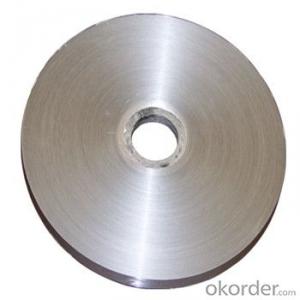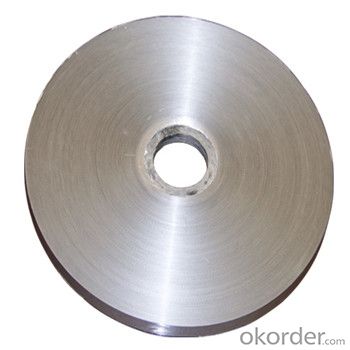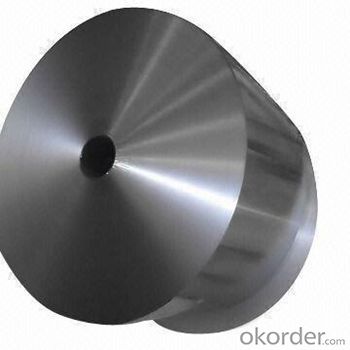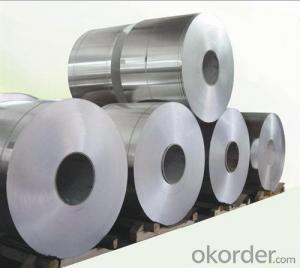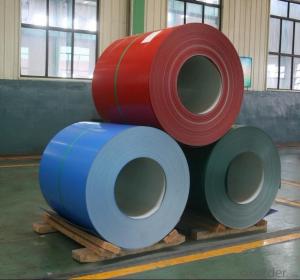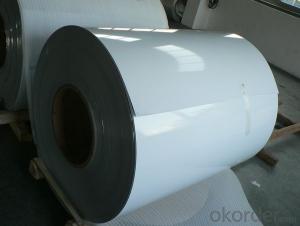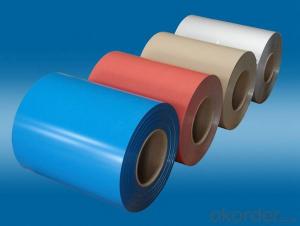Painting Aluminum Coil Stock for Cable & Wire Production
- Loading Port:
- China main port
- Payment Terms:
- TT OR LC
- Min Order Qty:
- 3 m.t
- Supply Capability:
- 10000 m.t/month
OKorder Service Pledge
OKorder Financial Service
You Might Also Like
Specification
1. Description of Plain Aluminium Foil for Cable & Wire Production
Aluminium foil polyester film lamianted (ALU PET) from aluminum foil provides waterproof and thermal insulation. Polyetser film acts as protection aluminum foil and high strength tensile.
| Constructure | Total Thickness | Weight | Yield |
| (g/m2) | (m2/kg) | ||
| AL7 PET12 | 22 mic | 39 | 25.6 |
| AL9 PET12 | 24 mic | 44 | 22.7 |
| A10 PET12 | 25 mic | 47 | 21.3 |
| AL7 PET12 AL7 | 32 mic | 63 | 15.9 |
| AL9 PET12 AL9 | 36 mic | 74 | 13.5 |
| AL10 PET12 AL10 | 38 mic | 79 | 12.7 |
| AL7 PET12 HDPE15 MPET12 | 67 mic | 104 | 9.6 |
| AL9 PET12 HDPE15 MPET12 | 69 mic | 106 | 9.4 |
| MPET12 HDPE15 MPET12 | 48 mic | 65 | 15.4 |
2. Advantages of Plain Aluminium Foil for Cable & Wire Production
1.High strength of polyester film, waterproof thermal insualtion of aluminum foil
2.New and good quality basic materials
3.RoHS and SGS standard
Aluminium foil material ALU / PET tape is used for Ventilation Industry for flexible duct pipe production,Electronic, HVAC system, Estate Construction and so on.
3. Feature of Plain Aluminium Foil for Cable & Wire Production
*Such coil is specially designed to replace aluminum ingot, due to the high export tax of aluminum ingot, the coil has better price than ingot.
*This type of coil can fit customer's remelting furnace just like ingot, no need to make any change to the production line that was previously used for ingot. The standard coil size and weight is very suitable for the feed gate of furnace.
*This type of coil causes less material wastage than ingot when remelted.
*Our coil is made directly from ore, no need to go though the ingot making process, quality is much better than other suppliers who use ingot scrap to make coil.
Be free from Oil Stain, Dent, Inclusion, Scratches, Stain, Oxide Dicoloration, Breaks, Corrosion, Roll Marks, Dirt Streaks and other defect which will interfere with use
4. Certificate:
SGS and ROHS(if client request, paid by client), MTC(plant provided), Certificate of Origin(FORM A, FORM E, CO), Bureau Veritas and SGS (if client request, paid by client), CIQS certificate
5. Image of Plain Aluminium Foil for Cable & Wire Production
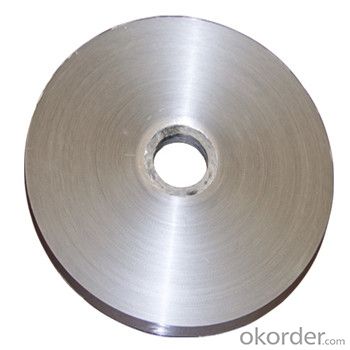
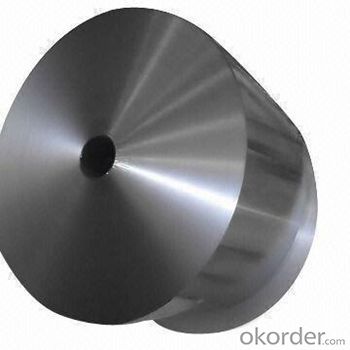
6. Package and shipping of Plain Aluminium Foil for Cable & Wire Production
eye to sky
eye to wall
with wooden pallet (wooden case also available)
7. FAQ
1) What is the delivery time?
Dpends on actual order, around 20 days
2) What is the QC system:
We have QC staff of 20 persons and advanced equipment, each production is with MTC traced from Aluminum ingot lot.
3) What market do you mainly sell to?
Australia, America, Asia, Middle East, Western Europe, Africa etc
- Q: I recently had to have a course of B-12 injections (my digestive system was not properly absorbing other forms). While I felt a significant improvement in mood, energy and memory, I was very concerned to discover that the B-12 shot came with a little something extra: aluminum! I'm wondering if the benefits outweigh the potential risks - why is aluminum placed in the injection? (Are there metal free versions out there?)
- Dietary okorder
- Q: You guys may be thinking, why the hell i posted this in the computer section. Well, I'm opening my computer, and I hate the anti-static wristbands. I know that by touching metal, you can get rid of all static electricity in your hands. Can you do this by touching aluminum foil? Since it's something everyone should have in their house.. Can it work like this?
- Static shield is fine. But for relatively unhealthy hair static, I use material softener sheets. Just rub over your hair. You too can rub the within of your coat with the dryer sheet, not more static. Keep one in a ziploc baggie to your coat pocket, it is going to final fairly a even as. Bonus, you scent like contemporary laundry :) Better than smelly Static Guard.
- Q: How are aluminum coils stored to prevent damage?
- Aluminum coils are typically stored in a controlled environment to prevent damage. The storage area should be clean, dry, and well-ventilated to avoid any moisture buildup that could lead to corrosion. The coils are usually stacked on pallets or racks to keep them off the ground and protect them from any potential damage from dirt, dust, or water. It is important to ensure that the storage area is free from any sharp objects or heavy items that could potentially dent or scratch the coils. Additionally, the coils should be stored in a way that prevents them from shifting or falling, which could cause deformation or other damages. Proper labeling and organization of the coils is also crucial to easily identify and access them without causing any harm. Overall, careful attention to storage conditions and handling practices is essential to maintain the integrity and quality of aluminum coils and prevent any potential damage.
- Q: What are the typical lead times for ordering aluminum coils?
- The typical lead times for ordering aluminum coils can vary depending on various factors such as the supplier, quantity, customization requirements, and current market conditions. However, on average, lead times can range from a few weeks to a couple of months. It is advisable to contact the specific supplier for accurate information regarding their lead times.
- Q: Are aluminum coils suitable for air conditioning systems?
- Yes, aluminum coils are suitable for air conditioning systems. Aluminum coils are commonly used in air conditioning systems due to their many advantages. Firstly, aluminum is a lightweight material, making it easier to handle and transport during installation. This also reduces the overall weight of the unit, making it more energy-efficient. Furthermore, aluminum coils have excellent heat transfer properties, allowing for efficient cooling of the air. They provide enhanced thermal conductivity, which helps in transferring heat quickly and effectively. This results in better cooling performance and improved energy efficiency, reducing electricity consumption and saving costs in the long run. Aluminum coils also offer superior corrosion resistance compared to other materials like copper. This is important in air conditioning systems, as they are exposed to moisture and humidity. Aluminum coils can withstand these conditions without corroding or deteriorating, ensuring longer lifespan and reliable performance. Another advantage of aluminum coils is their affordability. Aluminum is a cost-effective material, making it a popular choice for air conditioning manufacturers. This affordability can translate to lower costs for consumers, making air conditioning systems more accessible and affordable. In conclusion, aluminum coils are suitable for air conditioning systems due to their lightweight, excellent heat transfer properties, corrosion resistance, and affordability. They provide efficient cooling, durability, and cost-effectiveness, making them a preferred choice for air conditioning units.
- Q: How do aluminum coils contribute to improved building aesthetics?
- Aluminum coils contribute to improved building aesthetics in several ways. Firstly, aluminum coils can be used to create sleek and modern exterior finishes for buildings. The coils can be coated with various finishes such as brushed, anodized, or painted, allowing for a wide range of design possibilities. This versatility in finishes helps architects and designers achieve their desired aesthetic vision for the building. Additionally, aluminum coils can be easily shaped and formed into various profiles, giving buildings a unique and customized look. The coils can be bent, cut, or perforated to create intricate patterns or architectural details, enhancing the overall aesthetics of the structure. This flexibility in shaping allows for creative and visually appealing designs that can make a building stand out. Moreover, aluminum coils are lightweight yet durable, making them an ideal choice for cladding systems. By using aluminum coils as exterior cladding, buildings can achieve a modern and clean appearance. The lightweight nature of aluminum coils also makes installation easier and more cost-effective, ultimately contributing to improved building aesthetics. Furthermore, aluminum is a highly recyclable material, which aligns with sustainable building practices and environmentally friendly designs. Buildings incorporating aluminum coils can be seen as more visually appealing due to their eco-friendly attributes, reflecting the values of the project and its occupants. In conclusion, aluminum coils contribute to improved building aesthetics by providing a wide range of finishes, allowing for creative shaping and customization, offering lightweight and durable cladding options, and promoting sustainable design practices.
- Q: Can aluminum coils be used for radiation shielding?
- Yes, aluminum coils can be used for radiation shielding. Aluminum is often used as a shielding material due to its high atomic number and excellent attenuation properties, which effectively block and absorb radiation. It is commonly used in various industries, including medical, nuclear, and aerospace, for shielding against different types of radiation such as X-rays and gamma rays.
- Q: I'm 14 an was told that aluminum free deodorant would stop yellow stains on my white shirts, so which female deodorant would help stop yellow stains
- Deodorant with aluminum also causes breast cancer. I use Toms of Maine deodorant, which is aluminum-free.
- Q: This question asks for the methods and practices to keep aluminum coil in good condition and prevent damage or corrosion.
- <p>To maintain aluminum coil, follow these steps: Store the coil in a dry, clean environment to prevent moisture and dirt from causing rust. Keep it away from corrosive substances. Regularly inspect the coil for any signs of damage or corrosion, and address any issues promptly. Handle the coil carefully to avoid scratches or dents. Use protective coverings during transportation to prevent damage. Keep records of the coil's condition and maintenance history to track its performance over time. Regular maintenance will help extend the life of the aluminum coil and maintain its quality.</p>
- Q: What are the different width tolerances for aluminum coils?
- The different width tolerances for aluminum coils can vary depending on the specific industry and application. However, common width tolerances for aluminum coils range from +/- 0.005 inches to +/- 0.030 inches.
Send your message to us
Painting Aluminum Coil Stock for Cable & Wire Production
- Loading Port:
- China main port
- Payment Terms:
- TT OR LC
- Min Order Qty:
- 3 m.t
- Supply Capability:
- 10000 m.t/month
OKorder Service Pledge
OKorder Financial Service
Similar products
Hot products
Hot Searches
Related keywords
